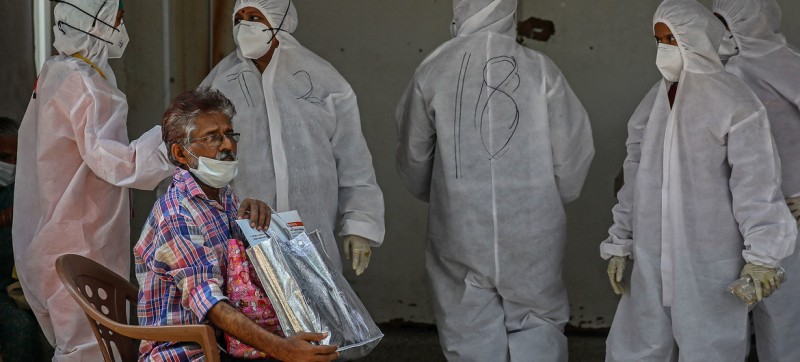A man waits to be tested for Covid outside a hospital in Mumbai, India. The World Health Organization (WHO) on Wednesday approved an eighth vaccine against COVID-19, which follows a slight uptick in new cases globally. COVAXIN, made by Indian company Bharat Biotech, has received WHO emergency use listing (EUL), meaning it could soon be available to millions worldwide.
Glad to see one more vaccine, #Covaxin, being granted @WHO emergency use listing. The more products we have to fight #COVID19, the better, but we must keep up the pressure to deliver #VaccinEquity & prioritize access to vulnerable groups who are still waiting for their 1st dose. https://t.co/wCgtSSNvJ1
— Tedros Adhanom Ghebreyesus (@DrTedros) November 3, 2021
The EUL process assesses the quality, safety and efficacy of vaccines and is a prerequisite for their inclusion in the global solidarity initiative, COVAX.
‘Keep up the pressure’
It also allows countries to expedite their regulatory approval to import and administer doses.
“This emergency use listing expands the availability of vaccines, the most effective medical tools we have to end the pandemic,” said Dr. Mariângela Simão, WHO Assistant-Director General for Access to Medicines and Health Products.
“But we must keep up the pressure to meet the needs of all populations, giving priority to the at-risk groups who are still waiting for their first dose, before we can start declaring victory.”
COVAXIN was already being administered in India, where authorities had approved its use since January, although a third phase of clinical trials was still ongoing, according to media reports. Bharat Biotech later produced data showing the vaccine was around 78 per cent effective.
Meeting WHO standards
A WHO advisory group assessed COVAXIN under the EUL procedure, based on review of data on quality, safety, efficacy, a risk management plan and programmatic suitability.
The vaccine was determined to meet WHO standards for protection against COVID-19, and green-lit for worldwide distribution.
Last month, COVAXIN was also reviewed by WHO’s Strategic Advisory Group of Experts on Immunization (SAGE), which formulates specific policies on vaccines and recommendations for their use.
SAGE has recommended COVAXIN use in two doses, with an interval of four weeks, in all age groups over 18.
Easy storage requirements
The vaccine was found to have 78 per cent efficacy against COVID-19 of any severity, 14 or more days after the second dose. It is also extremely suitable for low and middle-income countries due to its easy storage requirements.
WHO said available data on vaccination of pregnant women is insufficient to assess its safety or efficacy in this population, though studies are planned.
There have been nearly 247 million cases of COVID-19 worldwide, and more than five million deaths, according to latest available WHO data.
Over three million new infections were reported last week, representing a slight upward trend, the agency said in its most recent COVID-19 epidemiological update, published on Tuesday.
The rise was led by a six per cent increase in weekly new cases in Europe, as all other regions reported declines or stable trends.




Comments are closed.